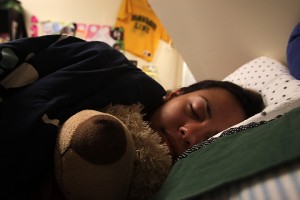
By Molly Dunn
Reporter
In a life full of activities, obligations and responsibilities, most college students put sleep at the bottom of the priorities list. Lori Genous, director for Baylor’s department of wellness, encourages students to value their time to sleep.
“When you are involved in so many things, it’s kind of hard to turn off sometimes and really just decompress and get that quality rest they really need,” she said.
Genous said students must get an adequate amount of sleep because without it academics and decision-making skills can be negatively affected.
“I think that, long term, you [students] are looking at not being as academically prepared as you could be, or should be,” Genous said.
Genous’ graduate assistant for the department of wellness, Will Lopez, said too often students put off sleep when things get hectic.
“We don’t properly account for how much time something takes. If you look at your schedule and it is packed with classes, activities, working out, eating and hanging out with friends, the easiest thing to cut is sleep,” Lopez said.
When students do not get enough sleep, they end up oversleeping on weekends, or acquiring lost hours by sleeping longer on different days. Genous said students should get the same amount of quality sleep each night in order to maintain a balanced sleep cycle.
“You can’t ever make up for lost sleep. The thing with sleep is that you have to be consistent with the number of hours you sleep every day,” Genous said. “You can be tempted to sleep in on the weekends, but it’s not the best choice to make.”
Instead of oversleeping on weekends or on random days, Genous and Lopez recommend quick naps during the day.
“Taking naps may work because sometimes all you need is 20 minutes or 30 minutes to re-energize and kind of get that next second wind or the ability to go on,” Genous said.
Lopez said also being conscious of where a student’s free time is spent can potentially provide more time to sleep.
“I’m a big proponent of taking short naps, 30-minute naps,” Lopez said. “If you take an inventory of what you do every day, like how much time you spend on the Internet, just some of the stuff that you don’t necessarily need to do, just try to cut that out of your life so you can have more time to sleep.”
Without a sufficient amount of sleep, students can become ill, fall behind in academics, break commitments or lose control of their daily routine.
Dr. Timothy Morgenthaler of the Mayo Clinic explained the effect lack of sleep can have on the body in an online article published by the clinic. “Lack of sleep can affect your immune system,” Morgenthaler said. “Lack of sleep can also affect how fast you recover if you do get sick.”
Genous encourages students to value the importance of getting adequate rest because of its overall effect on their lives.
“Sleep is a time where everything gets back in rhythm and there is a homeostatic mechanism at work there and it gets everything in balance,” she said. “Those things can be thrown off in that process if you don’t get enough sleep.”
Genous said exercising and eating healthy in addition to getting quality rest can help students lead healthier lives. Without enough sleep, students cannot function properly.
“I want students to make healthy choices and definitely getting enough sleep and quality sleep is a healthy choice for students,” Genous said. “I know it’s difficult. I know we have a lot of stuff going on, but just think about long-term effects of not giving your body what it needs. It can be detrimental.”
Baylor subscribes to Student Health 101, a newsletter that can be found throughout the Baylor website on the Wellness, Counseling Center, Health Services and the Baylor Horizon. January’s edition offers an article on getting quality rest as a college student. The current issue can be found at https://readsh101.com/baylor.html?id=567782ec.



